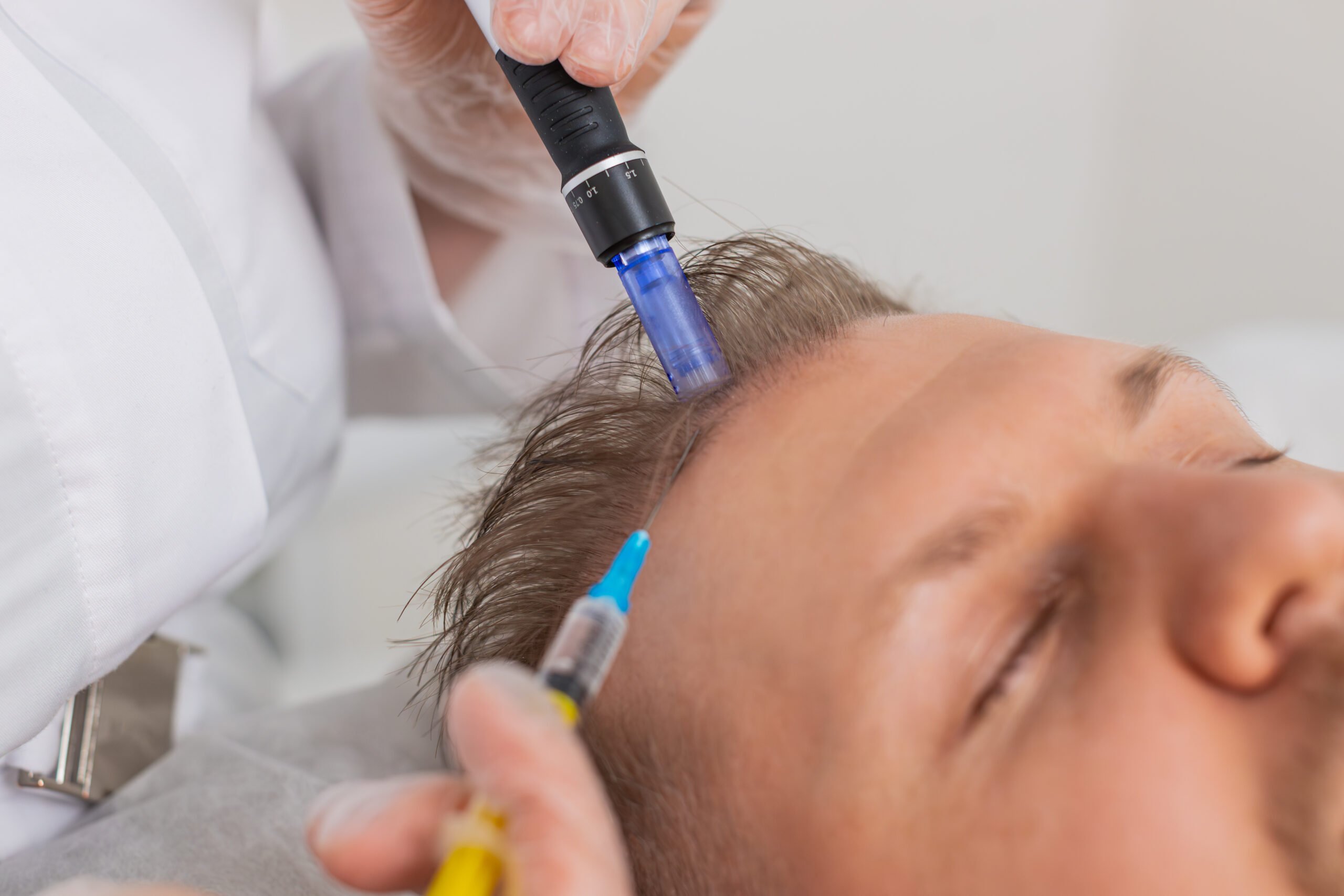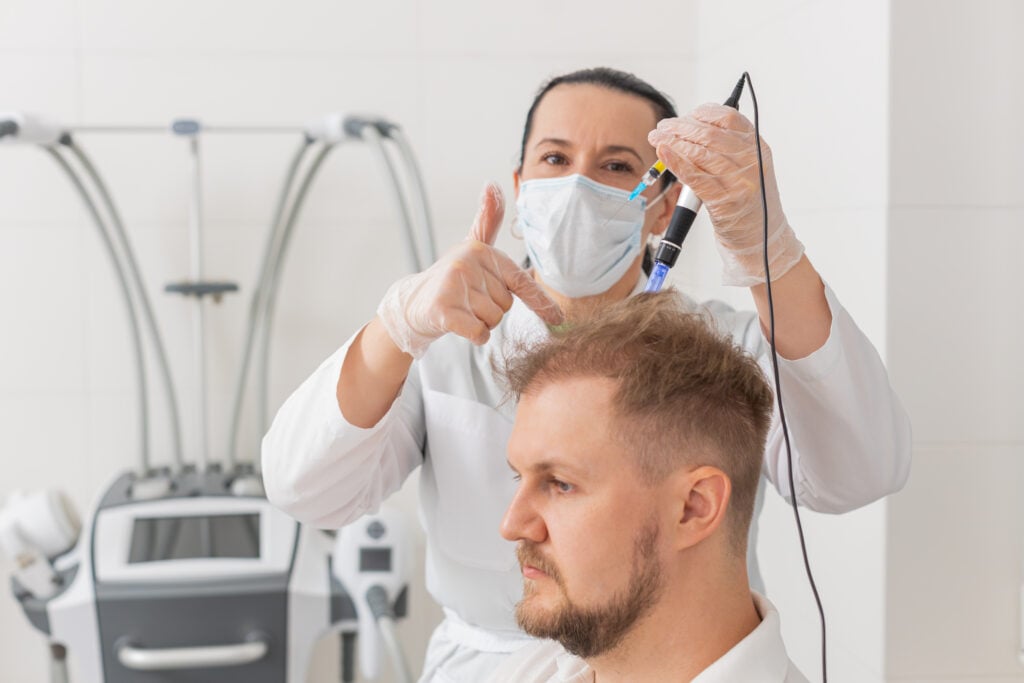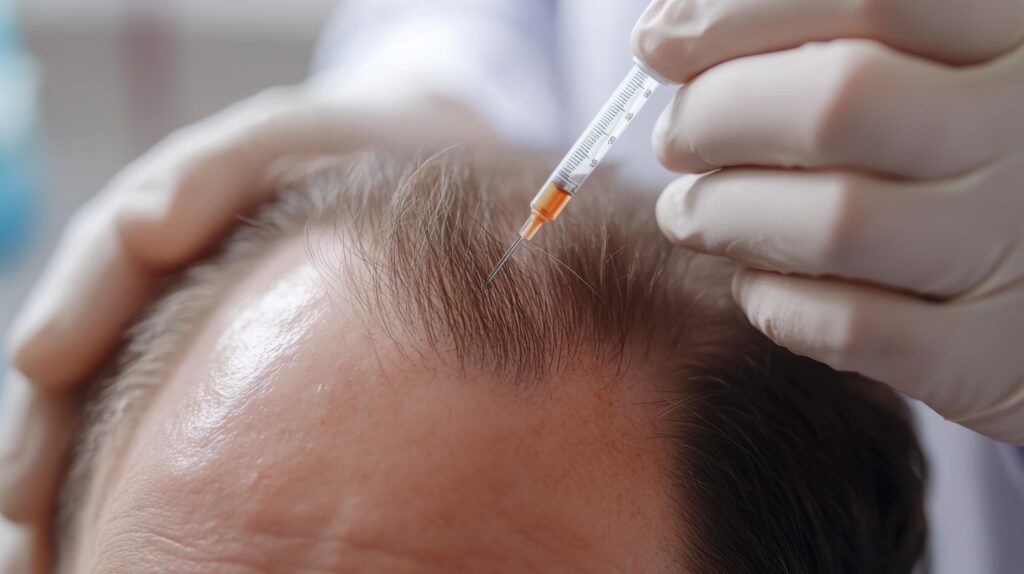
Exosome Therapy for Hair Loss: Is it Safe and Legal?
At Elithair, we know that anyone can suffer from hair loss – regardless of age, gender, or race. There are many different causes of hair loss, which means there is a huge range of treatment options available, some better suited to specific causes than others.
One such option that has been gaining a lot of attention of late is exosome therapy. Though exosome therapy is currently not available legally in the UK, research continues to suggest that it has the potential to someday treat hair loss. In this article we’ll be taking a close look at how exosome therapy works, who could someday eligible for this treatment, and how it would measure up with other methods available.
What is Exosome Therapy?
All of the body’s cells produce exosomes; extracellular vesicles which move throughout the body, delivering proteins, lipids, and growth factors. For a time, scientists believed exosomes to be cellular waste, but in recent years their important role in the human body has been researched more extensively.
Due to their ability to transfer key molecules throughout the body, exosomes show great potential in treating wounds, fighting inflammation and, yes, improving hair growth. Exosome therapy can involve the extraction of exosomes from either stem cells, skin cells, or cells from hair follicles.
Since exosomes can be extracted from a variety of sources, exosome therapy can use exosomes from the patient themselves (autologous exosome therapy) or from a donor (allogenic exosome therapy), though donor exosomes are more commonly extracted from stem cells as opposed to other sources.
Once a solution is developed using the extracted exosomes, be they taken from the patient or a donor, they are then administered via injection, with the location dependent on the desired outcome of the patient; be that to aid in healing wounds, reducing inflammation, or boosting hair growth.

How Does Exosome Therapy Work for Hair Regrowth?
If used for hair growth, exosome therapy could follow a procedure which is similar to PRP treatments. Once an exosome solution has been developed, it would then be administered to the patient via injection or derma roller to the scalp. As the procedure is minimally invasive, next to no recovery time would be required.
The applied exosome solution would then provide key nutrients and growth factors directly to the hair follicles, which has the potential to boost hair growth. Additionally, exosomes can improve blood flow to the area targeted by the therapy, further improving the absorption of necessary nutrients.
Some studies have suggested that exosome therapy can activate hair follicle stem cells, which could also account for the reported benefits of the treatment. However, clinical studies in this area have been few and more research is needed.
Who Would be a Good Candidate for Exosome Therapy?
Presently, there isn’t enough research to state with any certainty which forms of alopecia could be best treated with exosome therapies. Should it become an available treatment in the near future, we would still recommend that you speak to your doctor before booking any treatments. Only by discussing your case with a healthcare professional can you ascertain which course of treatment is the most appropriate for your underlying hair loss.
There has been some research that suggests that exosomes derived specifically from amniotic stem cells can prevent fibrotic scarring. When using this source of exosomes as part of the treatment, it could prove beneficial for people suffering from scarring alopecia.

Exosome Therapy vs. Other Hair Loss Treatments
While exosome therapy is not currently available in the UK, there are many effective options available for those suffering from hair loss. As previously stated, we always recommend that you speak to your doctor before pursuing any treatments in order to find the best solution for your hair’s needs.
Here are some popular treatment options available in the UK:
- Minoxidil: A medication that can be applied topically or taken orally, available to both men and women (albeit women are advised to take only the 2mg dosage). Minoxidil has been proven to boost hair growth but must be used consistently in order to maintain hair density. Once the course of medication is halted, hair loss will resume.
- Platelet Rich Plasma (PRP) Therapy: PRP is similar to exosome therapy in that it is a minimally invasive treatment that uses materials extracted from the body (in this case, plasma from the patient’s own blood) to be injected as a solution to treat hair loss. Unlike exosome therapy, it is legal and available to patients in the UK.
- Finasteride: Finasteride is an oral medication available to men experiencing hair loss. While its efficacy in treating hair loss is well-established, common side-effects include erectile dysfunction, sexual dysfunction, and depression. Like Minoxidil, halting the course of treatment will also cause hair loss to return.
- Hair Transplant: Hair transplants are still the only long-term solution to hair loss. However, this option is only suggested for patients suffering from genetic hair loss. Therefore it is essential that the underlying cause of your hair loss is diagnosed by a doctor before any treatment commences.
Is Exosome Therapy Safe and Approved in the UK?
No, at present exosome therapy is not approved for use in the UK. While some clinics in the UK have been advertising and administering exosome therapies, they have been doing so illegally. As these products and services are currently not authorised in the United Kingdom, we would warn readers against receiving any such therapies.
While research on exosome therapies looks promising, receiving such treatments illegally is not worth the risk. There may well come a day when there is greater research supporting the safety and efficacy of these treatments. Until then, there are many other safe, reliable and tested solutions that patients can explore instead.
Conclusion: Don’t Take the Risk
Exosome therapies for skin, hair and other ailments may continue to be reported on in the press, but for now receiving such treatments in the UK isn’t just unwise – it’s illegal. When it comes to the health of your hair and scalp, it simply isn’t worth taking any unnecessary risks.
If you’d like to explore the safe and legal options at your disposal, feel free to contact one of our experts today. We are on hand to talk you through your hair journey.
FAQs
Are there any side effects or risks associated with exosome therapy?
Potential side effects may include inflammation, redness, or infection at the injection site. Since the therapy is still under investigation, long-term risks are not well understood, and the lack of regulation increases the chance of complications if performed illegally.
Is exosome therapy suitable for women?
In theory, yes – exosome therapy could benefit both men and women experiencing hair loss. However, no gender-specific research has been published, and suitability would depend on the underlying cause of hair loss and the patient’s medical history.
How does exosome therapy differ from stem cell therapy?
Exosome therapy uses the extracellular vesicles secreted by cells, while stem cell therapy involves the use of entire living cells. Exosomes carry signals and proteins from their origin cells, but do not replicate or differentiate like stem cells, making them a potentially safer but less understood option.
Why is exosome therapy banned in the UK?
Exosome therapy is banned because it has not yet received approval from the Medicines and Healthcare products Regulatory Agency (MHRA). This is due to a lack of sufficient clinical evidence regarding its safety, consistency, and effectiveness for treating hair loss or other conditions.


